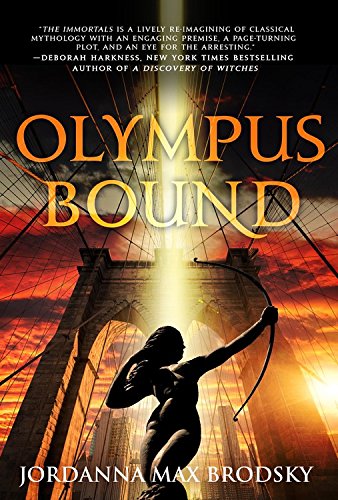
![]() Olympus Bound by Jordanna Max Brodsky
Olympus Bound by Jordanna Max Brodsky
Warning: some mild spoilers for both The Immortals and Winter of the Gods will be unavoidable.
In Olympus Bound (2018), Jordanna Max Brodsky concludes the OLYMPUS BOUND trilogy she began with The Immortals, featuring the Greek goddess Artemis living in modern-day New York City under various appellations, including Selene. As the books progressed, the remaining Greek gods dwindled in number, murdered or sacrificed in the name of an ancient and seemingly unstoppable cult. But now, Selene knows the identity of the cult leader and his ultimate goal, and must travel from her beloved city to the Mediterranean Sea, gathering divine weapons and allies, and strengthening her resolve before all-out war must be waged atop Mount Olympus.
Meanwhile, Theo Schultz — who believes Selene to be dead after their terrible battle against the Mithraist cult at the end of Winter of the Gods — is a man obsessed with the cult and its rituals, and in Selene’s absence has begun his own efforts to stop the cult and its Pater Patrum. Believing that his status as makarites paired with his knowledge as a scholar of classics will give him special insight, he’s committed himself to defeating the cult before any more gods are killed (or die trying).
The stakes are very high in Olympus Bound, primarily because the seemingly-unassailable gods are in mortal peril from the cultists, but also because the Athanatoi (“those who cannot die”) are a fractious and squabbling lot, liable to hold millennia-long grudges. They have very little in common, and some of them have more skill in adjusting to the needs of modern humans than others do. The true test for Selene is whether she can convince her family to unite long enough to save themselves, or whether their endless bickering will do the cult’s work for them.
 While reading The Immortals and Winter of the Gods, I often remarked to myself that I was eager to see more goddesses appear within the narrative, not only because of the different insight they might provide to Selene’s fight against the Mithraists, but because I was genuinely curious to see how mythological figures like Athena, Demeter, and Hera might have adapted (or not) to the modern world. To my great satisfaction, Brodsky answers that question in Olympus Bound, and their sensitive and nuanced portrayals are absolutely the equal of characters like Apollo, Hermes, and Zeus himself. Just as importantly, Theo and his human allies Gabi, Minh Lo, and Ruth are indispensable, and are as key to the narrative as the Athanatoi.
While reading The Immortals and Winter of the Gods, I often remarked to myself that I was eager to see more goddesses appear within the narrative, not only because of the different insight they might provide to Selene’s fight against the Mithraists, but because I was genuinely curious to see how mythological figures like Athena, Demeter, and Hera might have adapted (or not) to the modern world. To my great satisfaction, Brodsky answers that question in Olympus Bound, and their sensitive and nuanced portrayals are absolutely the equal of characters like Apollo, Hermes, and Zeus himself. Just as importantly, Theo and his human allies Gabi, Minh Lo, and Ruth are indispensable, and are as key to the narrative as the Athanatoi.
One of the OLYMPUS BOUND series’ many over-arching themes is an examination of the ways in which humanity has changed throughout history; another is the inequity of Selene and Theo’s relationship and their struggle to view each other as real people; yet another is a persistent inequity between men and women, and the power struggles between them. All of these come to bear on Olympus Bound’s terrific climax in completely unexpected and wonderful ways, and I don’t mind telling you that I frequently felt as though my heart was in my throat — I had no idea how it would all end, or who would come out safely on the other side of the battle, as Brodsky never left a single hint that any character’s fate was secure. I literally couldn’t put this book down until I read the very last page.
I enjoyed the entire OLYMPUS BOUND trilogy tremendously, and absolutely recommend it to fans of Greek mythology, classics, and really well-done fiction with great characters. Olympus Bound was wonderful, and I happily look forward to reading anything Brodsky chooses to write in the future.



Another series for the To Be Read list!
Would love to purchase the third book but will not use Amazon! Please advise! Currently sitting in Barnes & Nobles dejected bought first two here.